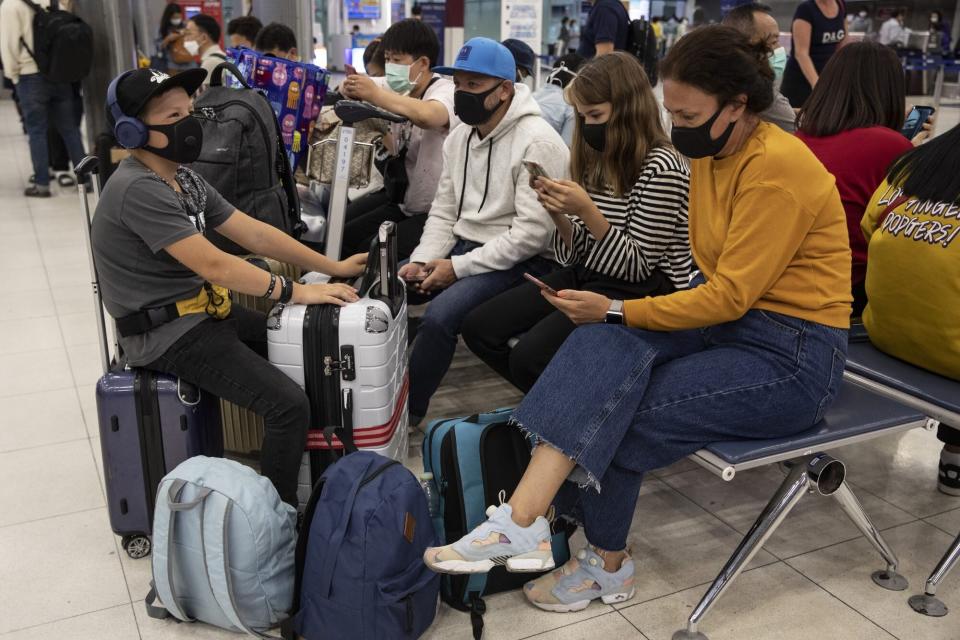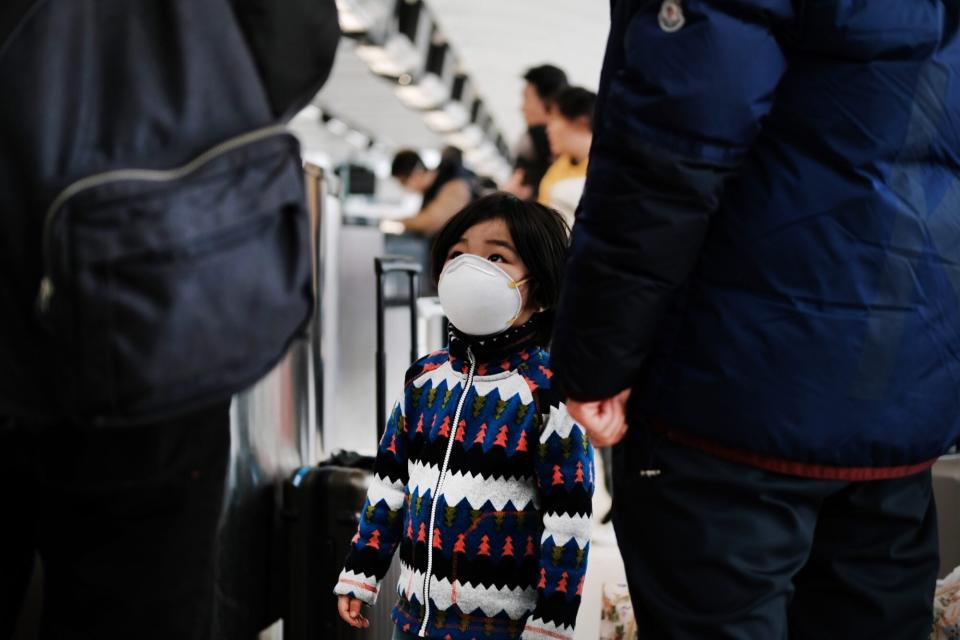Should My Family Be Flying? The Latest COVID-19 Travel Advisories and Precautions to Take
Check the Centers for Disease Control and Prevention (CDC) and Parents.com's COVID-19 Guide for up-to-date information on statistics, disease spread, and travel advisories.
COVID-19 has spread to nearly every country—including the United States, which now has the most confirmed cases in the world. Throughout 2020, most countries had travel restrictions and even placed bans on travelers coming from the U.S. as coronavirus cases surged.
In early 2021, the Centers for Disease Control and Prevention (CDC) issued an order for all international travelers—as well as Americans traveling abroad—to test negative for COVID-19 before entering the U.S. More coronavirus travel mandates—including wearing masks in airports and on airplanes—have been implemented since then.
The CDC currently urges unvaccinated Americans to avoid unnecessary travel but gives the green light to vaccinated individuals as long as they take proper safety precautions.
Given these restrictions and recommendations, travelers might wonder if it's safe to fly. Here's a rundown on the latest coronavirus travel advisories so you can decide whether you should be canceling flights. Experts also weigh in on precautions to take when traveling during the pandemic.

Paula Bronstein/Getty Images
Current CDC Recommendations
The CDC recommends putting off travel until you're fully vaccinated (two weeks after your last shot), and even then, it's best to take safety precautions. Here are latest travel recommendations.
Domestic Travel and COVID-19
Domestic travel is OK for vaccinated individuals, though they should still wear a mask, social distance, avoid crowds, and wash hands frequently. They can also skip self-quarantining and don't need to get a COVID-19 test before or after travel unless specifically required.
If you're not vaccinated and traveling domestically, the CDC recommends that you get tested one to three days before your trip, adhere to standard safety practices while traveling, get tested again three to five days after traveling, and self-quarantine for a full seven days. If you decide to skip the second test, it's recommended that you quarantine for at least 10 days before being around others.
Don't travel if you were exposed to COVID-19, you are sick, you test positive for COVID-19 and haven't ended isolation, or you're waiting for results of a COVID-19 test, says the CDC.
International Travel and COVID-19
International travel is also considered safe for vaccinated Americans. However, it may pose more of a risk than domestic travel, so you'll still want to follow all recommended safety precautions. Fully vaccinated people don't need to get tested before leaving the U.S. unless your destination requires it; unvaccinated people should get tested one to three days before their trip.
In December 2021, the CDC changed their testing guidance for entering the U.S. Now all air travelers "must show a negative COVID-19 test taken no more than one day before travel to the United States"—regardless of vaccination status, says the organization. This rule applies to those over 2 years old.
It's also recommended that you get a COVID-19 test three to five days after travel—and that goes for all travelers, vaccinated or not. Fully vaccinated travelers can skip self-quarantining after returning to the U.S.
If you're not vaccinated, the CDC recommends delaying international travel. If you must travel, quarantine for a full seven days after, even if you test negative at three-five days. If you forgo this test, quarantine for a full 10 days.
Note that for any travel, whether domestic or international, vaccinated parents with unvaccinated kids may want to proceed with caution and weigh the risks of traveling before booking a trip. Also check state, local, airline, and destination travel restrictions before booking your trip to make sure there's nothing else you'll need to do.

Spencer Platt/Getty Images At the terminal that serves planes bound for China, a child wears a medical mask out of concern over the Coronavirus at John F. Kennedy Airport (JFK) out of concern over the Coronavirus on January 31, 2020 in New York City. The virus, which has so far killed over 200 people and infected an estimated 9,900 people, is believed to have started in the Chinese city of Wuhan.
CDC "Level Four" Travel Advisories
In an effort to control the spread of the coronavirus, the CDC and the U.S. State Department have issued a "level four" status—which means you should avoid all travel to them—on many international destinations where the COVID-19 risk is considered "very high." It's a good idea to check the CDC to see which locations are considered lower risk before booking your trip.
How Can I Prevent COVID-19 While Traveling?
Unfortunately there's much uncertainty regarding COVID-19, according to Miryam Wahrman, Ph.D., author of The Hand Book: Surviving in a Germ-Filled World. And while the Food and Drug Administration (FDA) has approved three COVID-19 vaccines (Moderna, Pfizer, and Johnson & Johnson), people under 5 aren't eligible to get them yet. That's why it's still important to take safety precautions while traveling.
For unvaccinated people, the CDC recommends the use of face masks in public settings where social distancing might be difficult, and that would definitely apply on an airplane. In fact, it's a federal law for all people (vaccinated or not) to wear face masks in airports and on planes.
Practicing proper hand hygiene is also key to prevent COVID-19 transmission. "Wash your hands with soap and water—especially before eating and touching your face," says Kathleen DiCaprio, Ph.D., an infectious disease expert from Touro College of Osteopathic Medicine who helped develop the vaccine for the Ebola virus. Scrub for at least 20 seconds, rinse with water, and thoroughly dry with a clean paper towel.
There are also other ways to prevent transmission when traveling by plane. Use alcohol-based sanitizer or disinfectant wipes on items other people have touched, such as tray tables and armrests. Take measures when going through security, when "your stuff touches bins that held other people's stuff and could pick up germs," says Dr. Wahrman. She recommends bringing a few clear Ziploc bags, and then sticking your items in these bags before putting them in the bins. It's also worth checking what safety measures the airline is taking to make travel safer for its customers. United Airlines, for example, requires all its employees to be vaccinated and has partnered with Clorox and the Cleveland Clinic to ensure it meets the latest disinfection protocols during every flight.
Finally, "if you see that there's somebody who looks visibly sick, try to create a little distance," says Dr. Wahrman. Granted, this might be easy in waiting rooms and baggage claim, but not so much if you're stuck next to a sick person on the plane.
Also remember it's possible that "you could be asymptomatic and still contagious," says Dr. Wahrman. This means someone you encounter might look perfectly healthy but is actually carrying the coronavirus. "Just be aware of the things you've been in contact with that could carry viruses and bacteria from other people," says Dr. Wahrman.
So, Should I Travel During the COVID-19 Pandemic?
At the end of the day, "you have to make a personal decision about the risk you're taking," says Dr. Wahrman. You're not required to cancel your plans, but social distancing is still recommended for unvaccinated people, and that might be a little tricky on an airplane or in an airport. You have to do what's best for you and your family, but experts do recommend staying home right now if you haven't been vaccinated.
"At this point, people who are traveling or plan to in the future should be aware of the certain travel restrictions and periodically check the CDC website on these restrictions. It may be helpful to check for any updates from the airlines and/or the airports they are arriving to or departing from as well," says Dr. DiCaprio.

